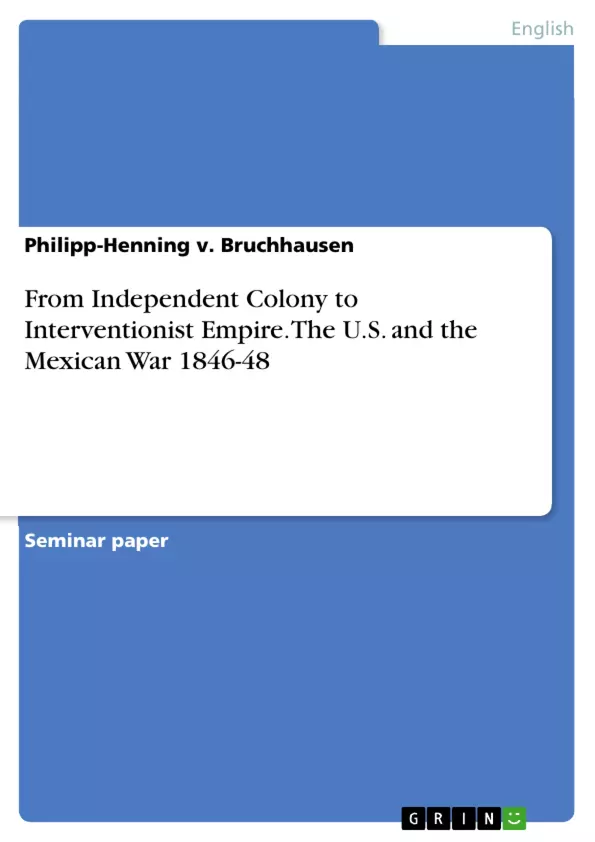The Mexican War from 1846-1848, is one of the more obscure, some would even say”forgotten” wars, out of the long list of international conflicts, the United States were party to.
It marks the first time though, that America as an independent nation invaded another independent nation, the multitude of armed conflicts with the native Indians and the former colonial powers since the Revolutionary War notwithstanding.
While the annexation of Texas and the following war, leading to the annexation of the whole modern south west of the USA, might have seemed to be the preordained outcome to most contemporary observers of the time, like John L. O´Sullivan, who actually coined the term Manifest Destiny in 1845, it was by no way unavoidable.
Actually, a couple of thousand more votes for the moderate Whig Party candidate Henry Clay in 1844, might have turned the war a lot less bloody, if war had erupted at all. But the close victory of (D) James K. Polk, who actually campaigned on the annexation of Texas without Mexico´s approval, almost assured a bitter conflict. Alas, the most crucial reason for the outbreak of the Mexican War, was not the Anglo-Saxon´s belief in Manifest Destiny, and the subsequent ruthless push westwards, but Mexico´s weakness to resist it. While the two freshly independent countries were posed to clash over Texas´s western and southern boundaries, a war on this scale could have easily been averted, if not for President Polk´s diplomatic ineptitude, and the Mexican´ elites´ willingness to sacrifice several ten thousand people just to demonstrate defiance and to keep their face.
Inhaltsverzeichnis (Table of Contents)
- I. Introduction
- II. The political landscape and the strategic reasoning behind the invasion
- III. The major battles and the ongoing guerrilla war
- 1. The battles
- 2. The partisan war
- IV. The aftermath of war and the consequences
- V. Conclusion
Zielsetzung und Themenschwerpunkte (Objectives and Key Themes)
This work provides a comprehensive analysis of the Mexican War of 1846-1848, examining the political context, strategic considerations, major battles, and the lasting consequences of the conflict. The paper delves into the contrasting historical trajectories of the United States and Mexico leading up to the war, shedding light on the factors that contributed to its eruption.
- The role of Manifest Destiny and its influence on American expansionism
- Mexico's internal political instability and its impact on its capacity to resist US aggression
- The strategic and military aspects of the war, encompassing both conventional battles and guerrilla warfare
- The lasting consequences of the war for both the United States and Mexico, including territorial changes and the development of national identities
- The complexities of the war as a historical event, highlighting its multifaceted nature and the interplay of various factors.
Zusammenfassung der Kapitel (Chapter Summaries)
The introduction sets the stage for the Mexican War, exploring its historical context and significance as the first instance of the United States invading another independent nation. It highlights the conflicting interpretations of the war in both American and Mexican historical narratives.
Chapter II delves into the contrasting political landscapes of the United States and Mexico in the mid-19th century. It examines the rise of Manifest Destiny in the US, contrasting it with Mexico's internal struggles and political instability. The chapter analyzes the strategic reasoning behind the US invasion, focusing on factors such as the annexation of Texas and the perceived weakness of Mexico.
Chapter III presents a detailed account of the major battles and the ongoing guerrilla war during the Mexican War. It explores the tactics employed by both sides, highlighting the challenges posed by the Mexican guerillas to the US military. The chapter analyzes the significance of key battles and their impact on the course of the war.
Chapter IV examines the immediate aftermath of the war and its lasting consequences. It delves into the territorial changes resulting from the conflict, including the US acquisition of vast territories in the Southwest. The chapter explores the socio-political ramifications of the war, including its impact on the development of national identities in both the United States and Mexico.
Schlüsselwörter (Keywords)
This work focuses on key concepts such as Manifest Destiny, American expansionism, Mexican War, Anglo-Mexican conflict, territorial acquisition, guerrilla warfare, strategic reasoning, political landscape, historical significance, and the lasting impact of conflict on national identities. It explores the complex interplay of these factors in shaping the historical trajectory of the US and Mexico during the mid-19th century.
Frequently Asked Questions
What were the main causes of the Mexican War (1846-1848)?
The primary causes included the U.S. annexation of Texas, the belief in Manifest Destiny, and diplomatic failures by President James K. Polk.
What is the significance of "Manifest Destiny"?
Coined by John L. O'Sullivan in 1845, it was the belief that the United States was destined by God to expand across the entire North American continent.
How did Mexico's internal situation affect the war?
Mexico's political instability and weakness made it difficult to resist the U.S. invasion effectively, despite a willingness to show defiance.
What role did guerrilla warfare play in the conflict?
Mexican partisans engaged in ongoing guerrilla warfare, which posed significant strategic challenges to the U.S. military beyond conventional battles.
What were the territorial consequences of the war?
The U.S. acquired vast territories in the Southwest, including modern-day California, Nevada, Utah, and parts of Arizona and New Mexico.
- Quote paper
- Philipp-Henning v. Bruchhausen (Author), 2016, From Independent Colony to Interventionist Empire. The U.S. and the Mexican War 1846-48, Munich, GRIN Verlag, https://www.grin.com/document/369091



